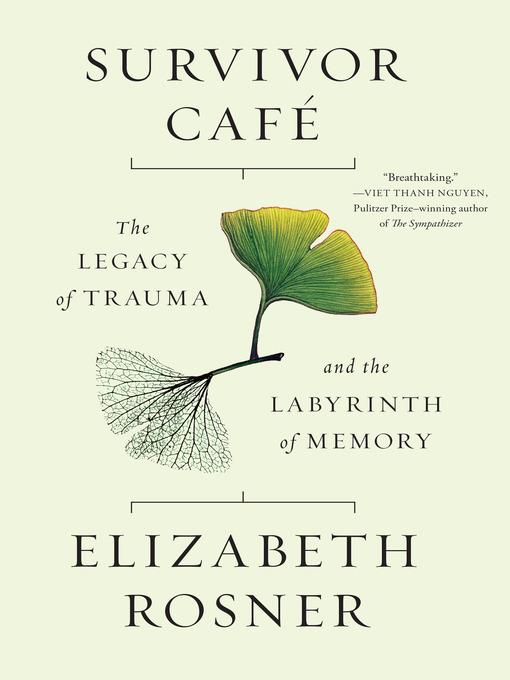
Survivor Café
The Legacy of Trauma and the Labyrinth of Memory
کتاب های مرتبط
- اطلاعات
- نقد و بررسی
- دیدگاه کاربران
نقد و بررسی

June 26, 2017
Novelist Rosner (Electric City) shines an unblinking light on the most horrific of 20th-century crimes and asks, what is the intergenerational legacy of trauma? How do we respect the survivors and honor the dead? How do we deal with the “limits of language” and the “ephemeral nature... of memory?” She considers art, anniversaries, memorials, and psychotherapy, but the most powerful technique she finds for dealing with trauma is simply telling the story behind it, “the paradoxical quest for preserving the intangible residue of loss.” In several of the collagelike chapters Rosner rummages through the words and works of others, attempting to find connection and meaning, but the emotional center of the book is her parents’ experience of the Holocaust and her “personal inheritance” of that memory. The book’s larger shape can be hard to see given its fragmented structure, but the themes of memory, language, and the bodily imprint of trauma are powerful, as are Rosner’s accounts of revisiting Buchenwald with her father. Despite the difficulties of capturing the unspeakable, Rosner’s conclusions—that powerful suffering must be communicated before healing can occur and that the most profound of human atrocities must be acknowledged so that their like does not happen again—open the door to understanding and, optimistically, show a path to peace.

June 15, 2017
Trauma informs a memoir palpable with anger, sorrow, and frustration.Poet, essayist, and novelist Rosner (Electric City, 2014, etc.) feels an intimate connection to the Holocaust: her father was imprisoned in Buchenwald concentration camp when he was 15, and her mother, at the age of 12, fled from her home in the Vilna ghetto and lived in hiding for two years, until the Russians drove the Nazis out of Poland. The two met later, married, and immigrated to the United States, where Rosner and her siblings were born. German culture and language were forbidden in her family, yet the author's life was shadowed by her parents' history. "Shards of their past lodged themselves inside me at birth, if not before," she writes, which infused her life with "grief, anxiety, rage, and so much more." Those emotions are shared, Rosner knows, with many others whose lives were blighted by atrocities: Vietnamese boat people, victims of the Cambodian Killing Fields, Japanese descendants of atom-bomb survivors or families interned in American camps, and survivors of Armenian, Rwandan, or Native American genocides. Although she empathetically considers others' experiences, her focus is on how her own identity has been shaped. The author looks to epigenetics for evidence of intergenerational trauma, passed to offspring in "mother's milk drenched in sadness" and other visceral ways: "we are inheriting more than the overt repeating of survival stories." Rosner acknowledges the need "to interrupt the cycle of trauma" through therapy and, at the same time, believes that the culture urgently needs those stories to ensure that the past will not be forgotten. She repeatedly expresses frustration with the inadequacy of words to convey horrific reality as well as by memorials and museums that fall short of offering "a personal shape for such collective and monumental mourning." Central to the narrative are three visits to Buchenwald with her father, for a commemoration, where inmates, liberators, and German residents gathered at a Survivor's Cafe, an emotional reunion. A thoughtful, probing meditation on the fragility of memory and the indelible inheritance of pain.
COPYRIGHT(2017) Kirkus Reviews, ALL RIGHTS RESERVED.

Starred review from September 1, 2017
This is a subject internationally acclaimed poet and novelist Rosner (Electric City, 2014) has been contemplating her whole life. The daughter of two Holocaust survivors, Rosner was often the unwitting recipient of her parents' experiences, though many questions went unasked, and many stories were left untold. Rosner's three trips to Germany with her father left her wondering how memories of the Holocaust will be preserved and honored as the ranks of survivors continue to dwindle. Who will be entrusted to bear witness? No matter the atrocitythe Killing Fields, Hiroshima, Rwandathe wounds humanity inflicts upon itself are writ large as survivors and their descendants cope with trauma, and genocides reshape history. Whether suffering is a result of an epic tragedy or individual grief, the act of keeping memory alive is a tricky balance of immediate comfort and continual pain. Rosner demonstrates a rare blend of scholarly assessment and personal revelation, tempering her singular passion with an encompassing mercy. In this important and vital contribution to the conversation about legacy and responsibility, Rosner distills the magnitude of such burdens and defines the scope of memorialization with an elegance and eloquence that reverberates with both depth and nuance.(Reprinted with permission of Booklist, copyright 2017, American Library Association.)

























دیدگاه کاربران